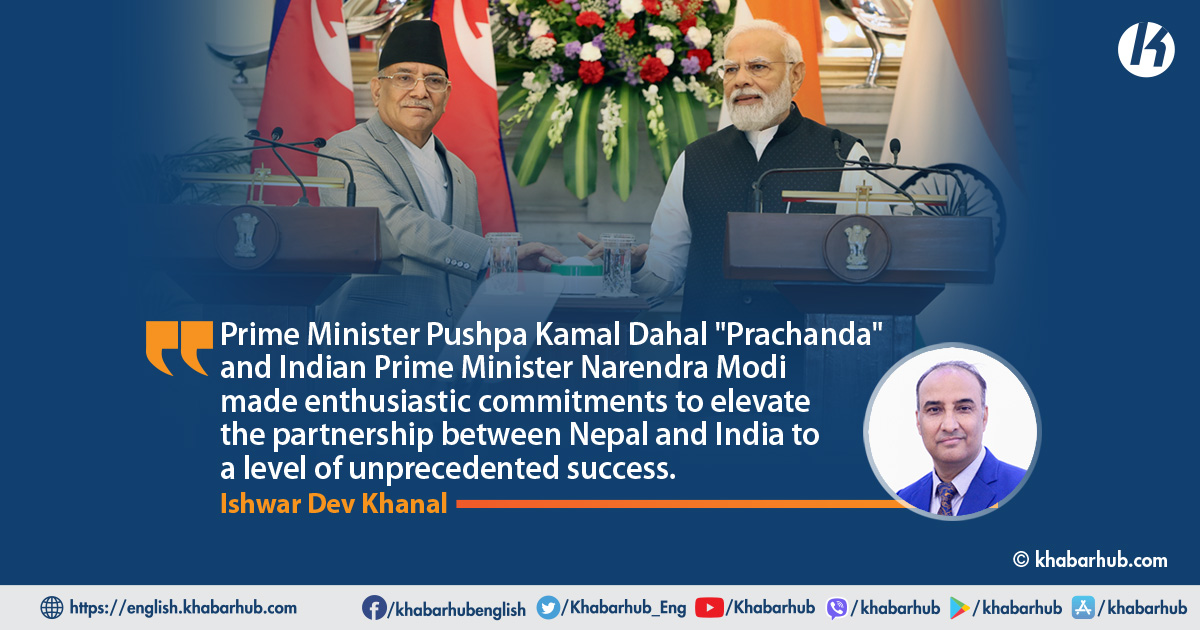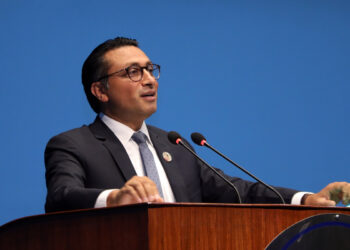KATHMANDU: On June 3, Prime Minister Pushpa Kamal Dahal “Prachanda” is anticipated to dub his four-day visit to India as “extremely successful,” as the joint commitment made by him and his Indian counterpart, Narendra Modi, to elevate the Nepal-India relationship beyond expectations exceeded his initial assumptions.
Furthermore, Indian Prime Minister Modi’s statement expressing the commitment to continue working towards elevating the India-Nepal relationship to great heights, akin to the Himalayas, is undoubtedly a source of delight for Prime Minister Dahal.
Prime Minister Modi also emphasized that in this spirit of collaboration, both nations are determined to address and resolve all issues, including those related to boundaries or any other matters.
Following a bilateral meeting at Hyderabad House in New Delhi, Thursday, Nepal and India signed seven agreements*, which could be viewed as a significant accomplishment for PM Dahal.
Additionally, Prime Minister Modi’s reaffirmation of the “HIT formula” to strengthen India-Nepal relations may have further elated PM Dahal as the former expressed his unwavering commitment to taking the bilateral relations between Nepal and India to unprecedented levels, including the resolution of all outstanding matters, such as the boundary issue.
Prime Minister Modi reflected on his initial visit to Nepal in 2014 and recalled that he had introduced a “HIT formula” aimed at strengthening India-Nepal relations.
“I remember… nine years ago, in 2014, I made my first visit to Nepal. At that time I had given a ‘HIT’ formula for India-Nepal relations – Highways, I-ways, and Trans-ways. I said we will establish such contacts that our borders do not become barriers. Today, the Nepal PM and I have taken many important decisions to make our partnership a super HIT,” Modi told a press conference after signing the agreements at Hyderabad House in New Delhi.
Furthermore, Indian Prime Minister Modi stressed that he and his Nepali counterpart Dahal took “substantial steps” and made important decisions to ensure that the partnership between the two neighbors attains remarkable success in the future, aiming for it to become “superhit.”
“We will continue our relentless efforts to elevate the India-Nepal relationship to unparalleled heights,” PM Modi said.
As a result of their discussions besides jointly inaugurating some infrastructure projects, PM Dahal and PM Modi signed seven agreements to enhance cooperation in various sectors, including trade and energy.
Now, consider what PM Dahal said: “This is my fourth visit to India. The bond between India and Nepal is deeply rooted in history. Today, we engaged in discussions to reinforce the ties between our nations. Additionally, we jointly inaugurated several groundbreaking projects.”
The two Prime Ministers signed significant agreements that include establishment of new railway connections to enhance physical connectivity and a long-term pact expected to bolster the electricity generation sectors of Nepal and India.
PM Modi and PM Dahal jointly launched projects such as handing over of Kurtha-Bijalpura section of railway line; inaugural run of an Indian railway cargo train from Bathnaha (India) to Nepal Customs Yard; and inauguration of Integrated Checkposts (ICPs) at Nepalgunj (Nepal) and Rupaidiha (India).
Similarly, others include ground breaking ceremony of ICP at Bhairahawa (Nepal) and Sonauli (India); ground breaking ceremony of phase-II facilities under Motihari-Amlekhgunj Petroleum Pipeline; and ground breaking ceremony of Indian portion of Gorakhpur-Bhutwal Transmission Line being built by a JV of PGCIL and NEA.
Similarly, Nepal and India also signed MoU/Agreements that include: Treaty of Transit between the Government of India and the Government of Nepal; MoU between the Government of India and the Government of Nepal for cooperation in the field of Petroleum Infrastructure; and MoU between Sushma Swaraj Institute of Foreign Service (SSIFS) and the Institute of Foreign Affairs, Nepal.
Others include MoU between the Government of India and the Government of Nepal for the development of infrastructure at Dodhara Chandani check post along Indo-Nepal Border; Project Development Agreement of Lower Arun Hydroelectric Project between M/S SJVN and Investment Board of Nepal; MoU between NHPC and VUCL, Nepal for the development of Phukot Karnali Hydroelectric Project; and MoU between NPCIL and NCHL, Nepal for cross border payments.
*List of Seven Agreements:
Renewal of Nepal-India Transit Agreement.
Establishment of integrated check post at Chandni Dodhara.
Agreement to build a petroleum pipeline from Amlekhganj to Chitwan and from Siliguri to Charali in Jhapa.
69 MW lower Arun with Indian company.
Agreement to be made by Fukot Karnali Indian Company.
Cooperation agreement between Institute of Foreign Affairs Studies and Sushma Swaraj Institute.
Agreement between Nepal and India to conduct financial transactions through QR code.
Power Sector
The discussion between the two sides focussed on cooperation in the power sector, as sources highlighted that Nepal presently exports over 450 MW of electricity to India.
Meanwhile, Indian companies have shown a strong interest in developing hydropower projects in Nepal, as demonstrated by their active participation in a Power Summit held in Kathmandu in April 2023.
In addition, agreements have been signed between India’s Satluj Jal Vidyut Nigam Ltd and the Nepal Electricity Authority for the development and execution of the 490.2 MW Arun-4 hydropower project.
This project is anticipated to generate electricity not only for Nepal and India but also for Bangladesh. Satluj Jal Vidyut Nigam Ltd holds a majority share of 51 percent, while the Nepal Electricity Authority holds the remaining 49 percent.
Nepal has also extended invitations to Indian companies to invest in the West Seti Hydropower Project.
Trains and Transit
On Thursday, Indian Prime Minister Modi and Nepal’s Prime Minister Dahal virtually inaugurated integrated check posts at Rupaidiha in India and Nepalgunj in Nepal, signifying the commitment to enhance border trade and facilitate smoother movement of goods.
Furthermore, they virtually flagged off a cargo train from Bihar to Nepal, highlighting the significance of improved connectivity between the two nations.
The Ramayana Circuit
India’s PM Modi acknowledged the enduring and strong religious and cultural ties between Nepal and India.
Hence, recognizing the significance of reinforcing these bonds, both countries have jointly decided to expedite the development of projects associated with the Ramayana Circuit.
The Ramayana Circuit is among the 15 identified tourism circuits aimed at promoting and enhancing tourism in the region.
Why is Nepal important for India?
Nepal holds significant importance for India in terms of its overall strategic interests in the region.
The leaders of both nations frequently emphasize the enduring “roti beti” relationship, which signifies the historical cross-border marriages between their people.
With a border spanning over 1,850 km, Nepal shares its borders with five Indian states such as Sikkim, West Bengal, Bihar, Uttar Pradesh, and Uttarakhand.
However, Indian PM Modi seems to be optimistic. He said, “We will establish contacts in a way that our borders do not become barriers. Today, the Prime Minister of Nepal and I have made numerous significant decisions to make our partnership a resounding success.”
In reciprocation to PM Modi’s sentiments, PM Dahal expressed that the relationship between Nepal and India is deeply rooted in history, and highlighted that during the discussions, they deliberated on measures to strengthen the ties between the two nations.
Later, India’s Foreign Secretary, Vinay Mohan Kwatra, highlighted that Nepal holds a significant position in India’s “Neighbourhood First Policy” and emphasized the unique nature of India’s relationship with Nepal, which is characterized by open borders and deep civilizational ties.
Kwatra, who previously served as India’s Ambassador to Nepal, stated that the talks between the two Prime Ministers reflected the traditional warmth and cordiality shared between the two countries.
However, he mentioned that the Agniveer issue was not discussed during the meeting between Prime Minister Modi and Prime Minister Dahal.
Indian Foreign Secretary Kwatra further clarified that the report prepared by the Eminent Persons Group (EPG) was not discussed during the meeting between Prime Minister Modi and Prime Minister Dahal.
It is noteworthy that the two countries established an eight-member panel of eminent individuals in 2016 with the objective of “reviewing bilateral relations in their entirety and suggesting the way forward.”
Prime Minister Pushpa Kamal Dahal “Prachanda” and Indian Prime Minister Narendra Modi made enthusiastic commitments to elevate the partnership between Nepal and India to a level of unprecedented success.









Comment